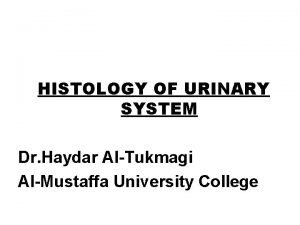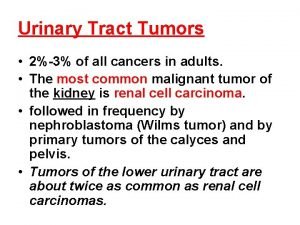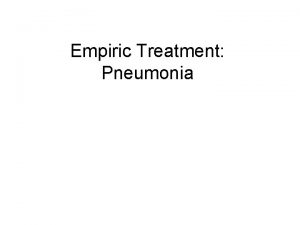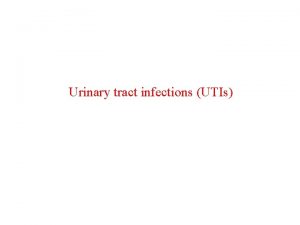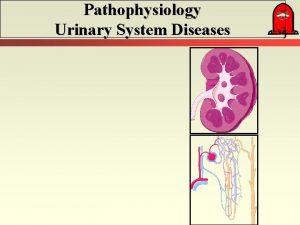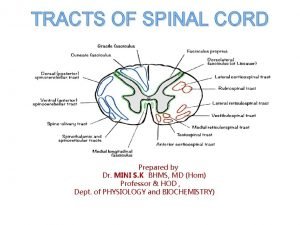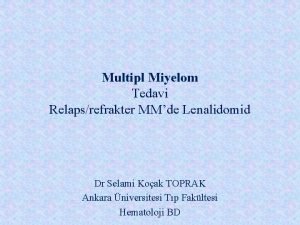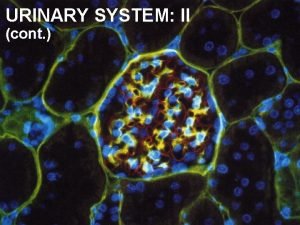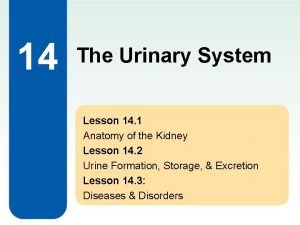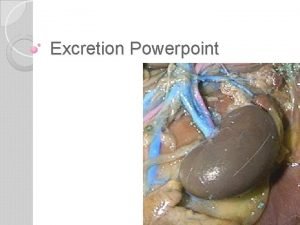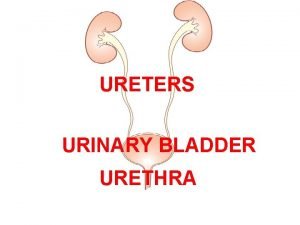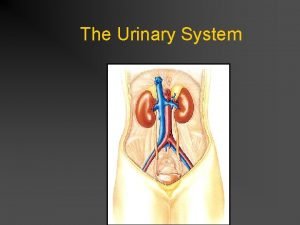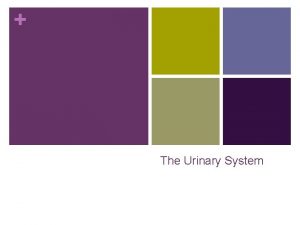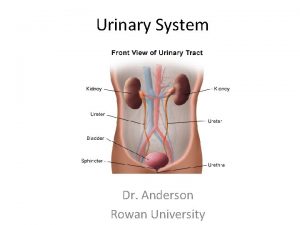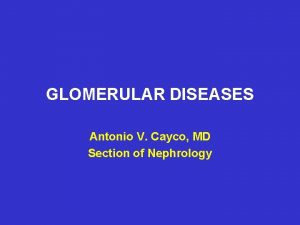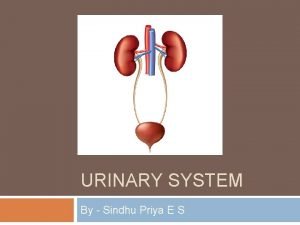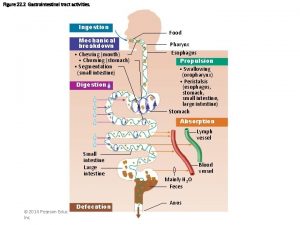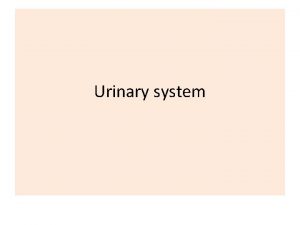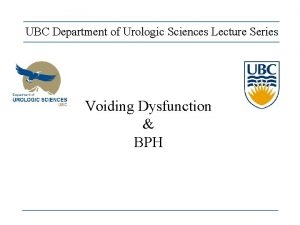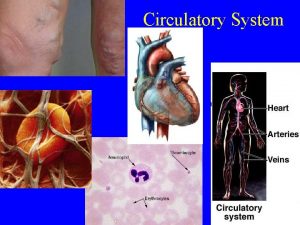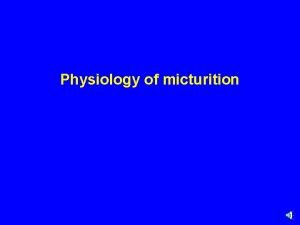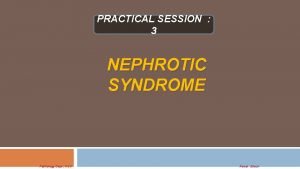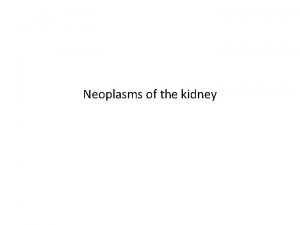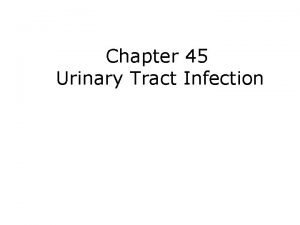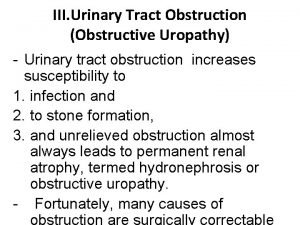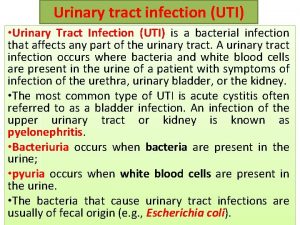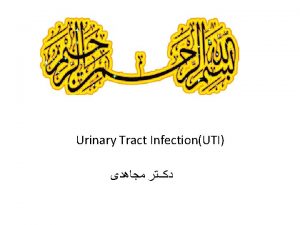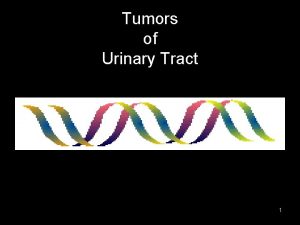Kidney Urinary Tract Neoplasms Jaroslava Dukov Kidney Cancer




























































- Slides: 60

Kidney & Urinary Tract Neoplasms Jaroslava Dušková

Kidney Cancer v 2% of the total human cancer burden, M: F 2: 1, middle age v preference for developed (industrialized) countries v risk factors: TOBACCO SMOKING, OBESITY

Symptoms v silent for a long time - discovered by chance v hematuria, backache, abdominal mass, metastatic spread v early hematogenic spread possible

WHO classification of tumours of the kidney (2004)

WHO Histogenetic groups (& number of nosology units identified) v Renal cell (12) v Metanephric (3) v Nephroblastic (3) v Mesenchymal (18) v Mixed mesenchymal and epithelial (3) v Neuroendocrine (5) v Hematopopietic and lymphoid (3) v Germ cell (2)

Epithelial Neoplasms of the Pelvis v Benign - papillomas v Malignant - carcinomas v papillocarcinomas v squamous cell Urinary ways

Kidney Tumours v Benign v Malignant

Kidney Adenoma Definition: v Formerly - diam. 2 -3 cm v Recently – only diam. less than 5 mm without a clear cell component – – tubulopapillary architecture lack of atypiae & mitoses

Epithelial Kidney Tumours benign v papillary tubulopapillary ADENOMAS (<5 mm!) v oncocytic (oncocytoma) v metanephric

Oncocytoma v Kidney cortex v may be multicentric and bilateral v Macro – tan with a central stellate scar v Micro - eosinophillic granular cytoplasm bizarre nuclei v Elmi – mitochondria filling up the cytoplasm v Biological behaviour benign

Kidney Tumours - mesenchymal Angiolipoleiomyoma – mixed mesenchymal tumour

Metanephric Adenoma v small dark cells v acinar and glomeruloid formations v calkospherites, calcifying non agressive

Benign Kidney Tumours Mimicking Carcinomas and Sarcomas v Metanephric adenoma - large & cellular v Oncocytoma - large with atypiae v Angioleiomyolipoma - large with atypiae

Epithelial Kidney Tumours Clear Conventional Cell v Papillary (chromophillic) v malignant CARCINOMAS v type 1 v type 2 v Chromophobe v classical v eosinophillic Sarcomatoid v Cystic v Collecting Duct v

Clear Cell Ca (Grawitz tumour) (75%) v Solid / cystic v Unilocullar or multilocular v Micro - solid or tubulocystic clear cytoplasm (fat & glycogen) v Immunohistochemistry cytokeratins, vimentin, CD 10, EMA, S-100 v Cytogenetics deletion of the short arm chromosome 3 (3 p) Prognosis: G, p. T dependent Sarcomatoid variant is the most malignant

Papillary (Chromophillic) Ca (10%) In dialysed more frequent v X-ray hypovascular v Histology – papillary/ tubulopapillary v type 1 – cubic cells type 2 - cylindric cells (worse prognosis) v Genetics – trisomy or tetrasomy 7 and 17 in men often Y chromosome missing mutation of c-met oncogen Prognosis : G, p. T dependent slightly better than in conventional ca

Chromophobe Carcinoma (5%) v Macro v Mikro - v Elmi v Genetics brown color solid, cytoplasms clear or eosinophillic, positive in Hale´s colloidal iron staining, raisin-like cell nuclei microvesicles in cytoplasm missing chromosomes 1, 2, 10, 13, 6, 21, 17 Prognosis: G, p. T dependent

Collecting Duct Carcinoma v Starts in the medulla v Micro v adenocarcinoma & urothelial like v hobnail cells v papillary v fibroplasia, mucin production v Imuno cytokeratin 13, vimentin, lectin Prognosis unfavourable

Nephroblastoma (Wilms´tumour) v syn. - embryonal adenosarcoma v Children - preschool age v Macro: gray-white large retroperitoneal mass palpable through abdominal wall v Micro: undifferentiated renal blastema, tubular and glomeruloid formations may be present v Prognosis: curable (stage!) v Follow up: - nephroblastomatosis

Role of the Pathologist in the Kidney Tumour Diagnostics v Typing v Biological Behaviour v Grading v Staging

Grading v Nuclear – Fuhrman et al. 1982 v Nuclear plus architecture v Proliferation factors - PCNA, Ki 67, Bcl 2 v Morphometry v DNA Analysis v Ag. NOR v Angiogenesis v Cytometry Flow cytometry

Staging v Size v Kidney capsule infiltration v Angioinvasion v Metastases in the lymph nodes v Number of lymph nodes involved v Metastases in the surrounding organs

Nuclear Grading in Kidney Cancer (Fuhrman et al. 1982) v Grade I small, uniform, round (10 ) inaparent or missing nucleoli v Grade II larger irregular (15 ) nucleoli small v Grade III large, irregular margins (20 ) nucleoli large v Grade IV large, bizarre, pleomorphic

Factors with an Adverse Prognosis Influence in Kidney Cancer Size diam. more than 12 cm Invasion to venes recidives Grading G III and G IV Staging most important Proliferation Index p 53 Expression

Kidney Cancer – complications 1. v metastatic spread & generalisation v manifestation via solitary bloodborne metastasis possible (pathological fracture, struma neoplastica…) v hematuria – anemia

Kidney Cancer – complications 2. v hormon production – erythropoietin polyglobulia Wood L, Swanepoel C, du Toit A, Jacobs P. Clinically silent renal tumour producing erythropoietin. S Afr Med J. 2003 Feb; 93(2): 128 -9. Shaheen M, Hilgarth KA, Hawes D, Badve S, Antony AC. A Mexican man with "too much blood". Lancet. 2003 Sep 6; 362(9386): 806. v insulin, glukagon, renin, HPL like substances

Urothelial Tumours

Urothelial Cancer v approx. 3% of total human cancer burden v increasing incidence v industrialized countries v risk factors: TOBACCO SMOKING aniline dye industry phenacetin schistosomiasis

Symptoms v hematuria (obstruction) (metastases)

Terminology …the term UROTHELIAL be used rather than „transitional“. . .

Normal urothelium multilayered variable number of layers empty bladder 4 -6 full bladder 2 -3

Normal urothelium Cells: – basal – superficial („umbrella“) polyploid, binuclear – neuroendocrine

„Variations“ of Urothelium – slight reactive changes von Brunn´s nests mucinous metaplasia squamous metaplasia (nonkeratinising, vagina type)

Metaplasia Def: change of one differentiated structure into another one (e. g. urothelium – squamous epithelium)

Urothelium Metaplasia Types: – squamous v nonkeratinizing Cause: iritation v keratinizing – mucinous – nephrogenic clear cell

Metaplasia Significance: v dif. dg. problem v with atypia precancerosis

Submucose – discontinual muscularis mucosae – continual row of vessels – important for staging of urothelial ca (p. T 1 a, p. T 1 b, p. Tx)

The WHO/ISUP Consensus Classification of Urothelial Neoplasms of the Urinary Bladder Epstein JI, Amin MB, Reuter VR, Mostofi FK, & the Bladder Consensus Conference Committee Am. J. Surg. Pathol. , 22, 1998, 1435 -8 WHO 2004

The WHO/ISUP Consensus Classification I. III. IV. Hyperplasia Flat lesions with atypia Papillary neoplasms Invasive neoplasms

The WHO/ISUP Consensus Classification I. Hyperplasia Flat Papillary

Hyperplasia Def: regular increase in number of uroth. layers (min. >7, mostly >10) slight increase in cell nuclei size, preserved architecture

Hyperplasia Significance: precancerosis 70% of patients with urothelial ca identical mutations

The WHO/ISUP Consensus Classification I. III. IV. Hyperplasia Flat lesions with atypia Papillary neoplasms Invasive neoplasms

II. Flat lesions with atypia – Reactive (inflammatory) atypia – Atypia of unknown significance – Dysplasia (LG IUN) – CIS (HG IUN)

Atypia of uncertain significance Def. : urothelial changes similar to reactive (inflammatory) ones where anusually high intensity of atypiae compared to minimal inflammatory background is present

Dysplasia DEF: disturbance of normal urothelium architecture & cytology

Dysplasia – with an inflammatory background – without -“ in a flat urothelium in the papillary urothelium

Dysplasia LG IUN – low grade intraurothelial neoplasia HG IUN/ CIS – high grade intraurothelial neoplasia

The WHO/ISUP Consensus Classification I. III. IV. Hyperplasia Flat lesions with atypia Papillary neoplasms Invasive neoplasms

III. Papillary neoplasms v Papilloma v Inverted papilloma v Papillary Urothelial Neoplasm of Low Malignant Potential PUNLMP v Papillary carcinoma, low grade v Papillary carcinoma, high grade

Papilloma WHO 1973 G 0 Def: circumscribed solitary papillary lesion covered with cytologically and architecturally normal urothelium.

Papillary neoplasm of low malignant potential Def. : well stratified urothelium bering features of slight dysplasia and increased number of layers

The WHO/ISUP Consensus Classification I. III. IV. Hyperplasia Flat lesions with atypia Papillary neoplasms Invasive neoplasms

Invasive neoplasms v lamina propria invasion (p. T 1 a, b) v muscularis propria (detrusor muscle) invasion (p. T 2 a, b) v perivesical tissue macro/micro (p. T 3 a, b) v surrounding organs/ abdominal wall (p. T 4 a, b)

Less Common Types of Urinary Bladder Cancer v v v v microcystic carcinoma with pseudosarcomatose stroma with bone or chondroid stromal metaplasia spinocellular adenocarcinoma undifferenciated ca with trophoblastic differentiation neuroendocrine

Non-Epithelial Bladder Tumours - Mesenchymal v v v leiomyomas and leiomyosarcomas rhabdomyosarcoma botryoides rhabdoid fibrohistiocytic vascular (capilllary, cavernous and angiovenous hemangiomas and hemangiosarcomas) malignant lymphomas

Non-Epithelial Bladder Tumours - Neuroectodermal v neurofibromas in Recklinghausen´s disease v melanoma v paraganglioma v composite pigmented paragangliomaganglioneuroma

Urinary Bladder Pseudotumors v v inflammatory malakoplakia amyloid deposits pseudosarcoma

Cystectomy – Biopsy Report MICRO: v type, grade (G) and stage (p. T) of the tumor v further urothelial abnormities v lymphatic and blood vessel invasion v presence / absence of the tumor in the resection margins and neighbouring organs v further abnormities of the neighbouring organs

Urinary Blader Cancer - complications v local recidives v progression v metastases
 Dr kiran bidari
Dr kiran bidari Nursing management for urinary tract infection
Nursing management for urinary tract infection Urethra
Urethra Urinary bladder histology
Urinary bladder histology ç
ç Tumor in the urinary tract
Tumor in the urinary tract Complicated urinary tract infection
Complicated urinary tract infection Urinary tract infection in pregnancy ppt
Urinary tract infection in pregnancy ppt Histological structure of kidney
Histological structure of kidney Pyramidal vs extrapyramidal tract
Pyramidal vs extrapyramidal tract Olivospinal tract vs tectospinal tract
Olivospinal tract vs tectospinal tract Jaroslava healer
Jaroslava healer Mudr. jaroslava orosová ml
Mudr. jaroslava orosová ml Jaroslava koníčková
Jaroslava koníčková Seer kidney cancer
Seer kidney cancer Stomach cancer symptons
Stomach cancer symptons Normal constituents of urine
Normal constituents of urine Urinary system
Urinary system Medullary rays
Medullary rays Urinary system model
Urinary system model Lesson 14.2 male and female urinary structures
Lesson 14.2 male and female urinary structures Urinary bladder
Urinary bladder Urethr o medical term
Urethr o medical term Anatomical structure of urinary system
Anatomical structure of urinary system Main excretory organs
Main excretory organs Where is vena cava
Where is vena cava Homework
Homework Urinary system
Urinary system Urinary system powerpoint
Urinary system powerpoint Impaired urinary elimination
Impaired urinary elimination Chapter 22 urinary elimination
Chapter 22 urinary elimination Chapter 30 the urinary system workbook answers
Chapter 30 the urinary system workbook answers Chapter 25 the urinary system
Chapter 25 the urinary system Ureteral blood supply
Ureteral blood supply Youtube urinary system
Youtube urinary system Bladder mesoderm
Bladder mesoderm Hysterosalpingography
Hysterosalpingography Layers of kidney
Layers of kidney Does the urinary system regulate blood pressure
Does the urinary system regulate blood pressure Urinary system fun fact
Urinary system fun fact Urianry
Urianry Interesting facts about urinary system
Interesting facts about urinary system Chapter 9 the urinary system labeling exercises
Chapter 9 the urinary system labeling exercises Lith medical terminology
Lith medical terminology Physiology of urine formation
Physiology of urine formation Transverse mesocolon
Transverse mesocolon External anatomy of a rat
External anatomy of a rat Renal medulla anatomy
Renal medulla anatomy Parietal layer of bowman's capsule
Parietal layer of bowman's capsule Urinary retention
Urinary retention Chapter 20 urinary/excretory system
Chapter 20 urinary/excretory system Chapter 22 urinary elimination
Chapter 22 urinary elimination Alterations in urinary elimination
Alterations in urinary elimination Function of urinary bladder
Function of urinary bladder Kidneys location and structure figure 15-1
Kidneys location and structure figure 15-1 A combining form for calyx is
A combining form for calyx is Rat urinary system
Rat urinary system Receptors of urinary bladder
Receptors of urinary bladder Urinary bladder
Urinary bladder Wilm's tumor
Wilm's tumor Classification of urinary antiseptics
Classification of urinary antiseptics



